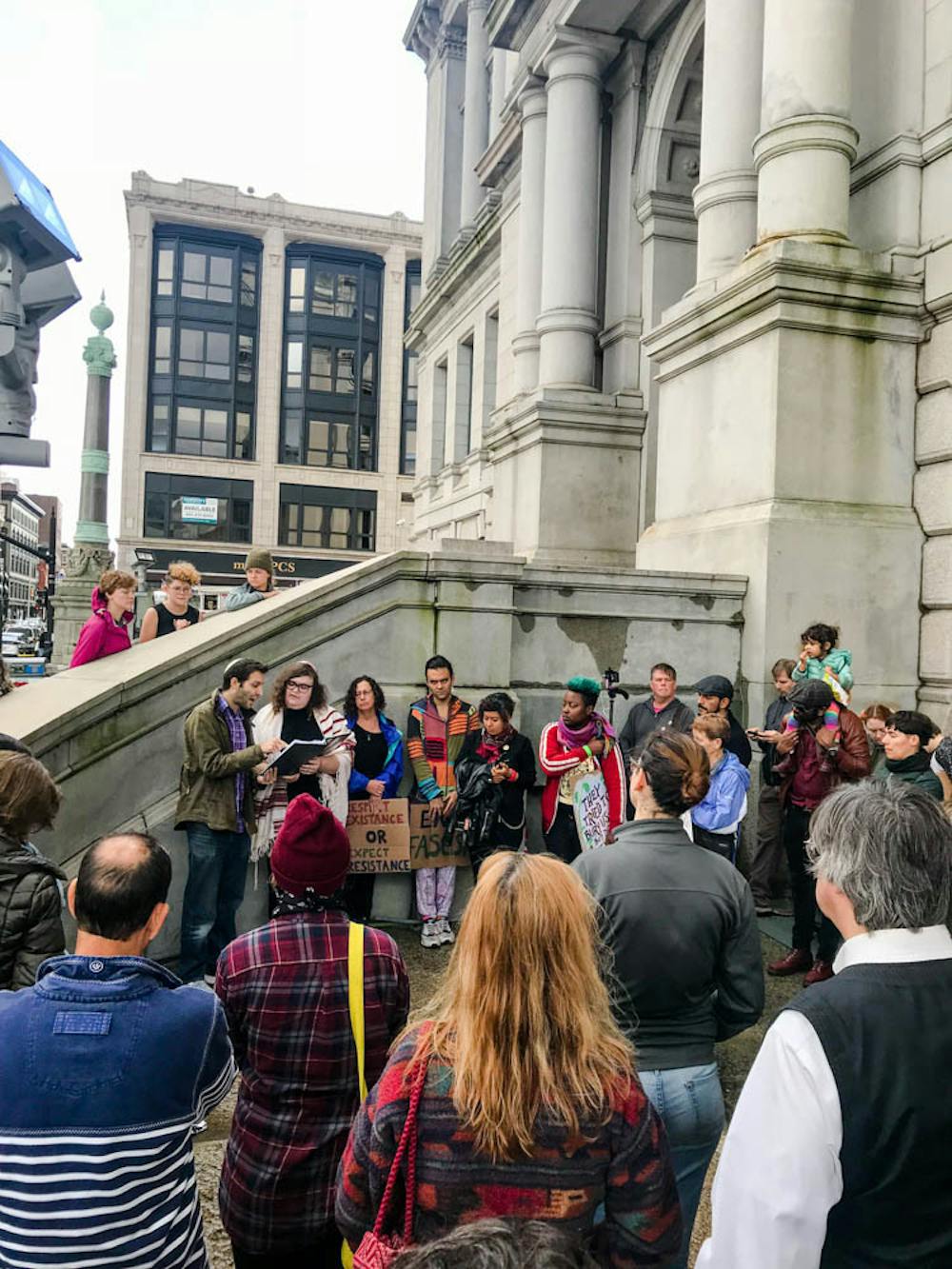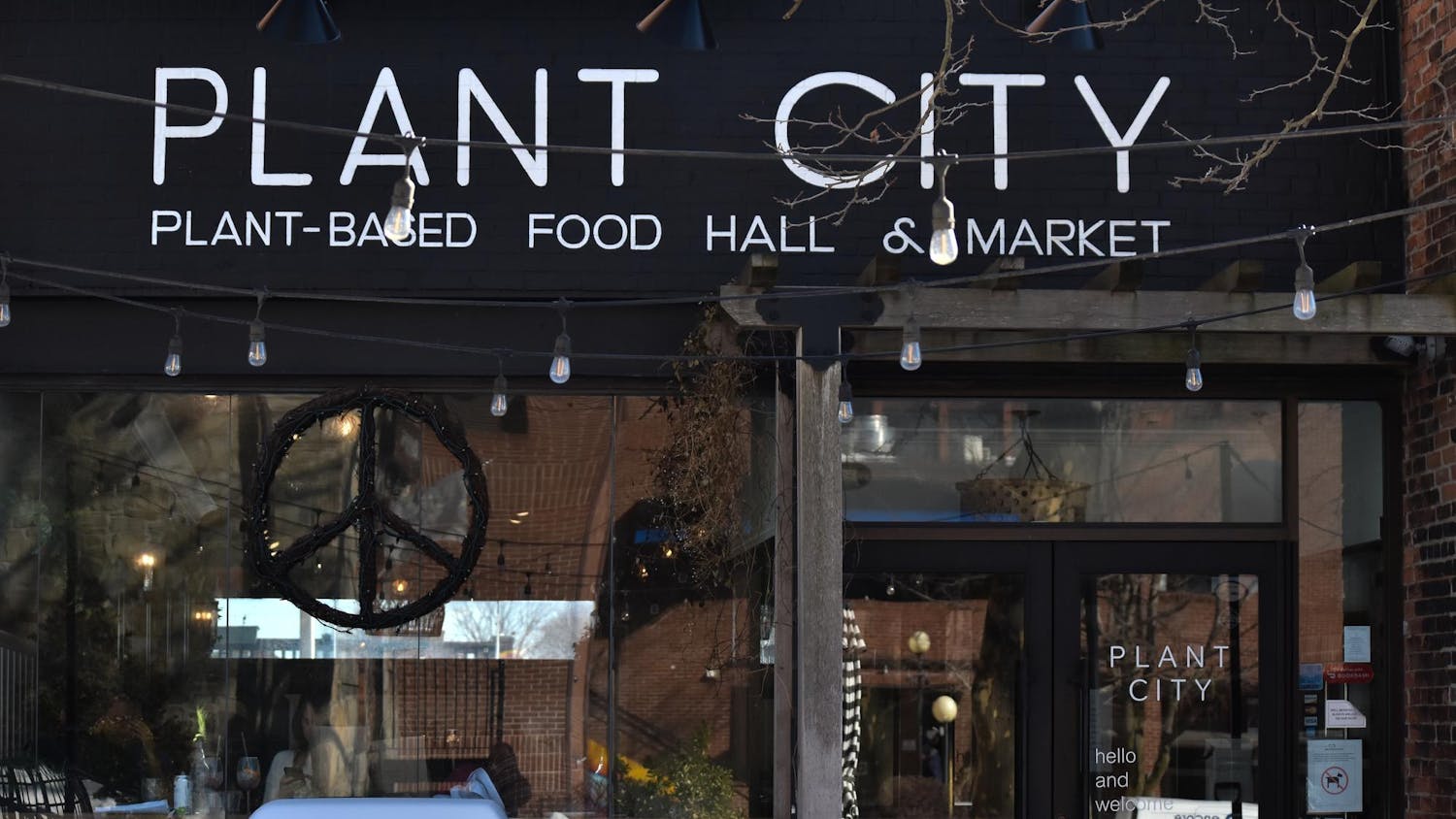Community members met in front of Providence City Hall Saturday afternoon in protest of white supremacy and fascism following the Oct. 27 massacre at the Tree of Life synagogue in Pittsburgh.
The rally, titled “Never Again: An Antifascist Assembly for Jewish Lives,” focused primarily on the recent proliferation of anti-Semitism throughout the country and denounced racism, transphobia and xenophobia as interrelated forms of hate. In addition to giving speeches and chanting political messages, participants recited Shabbat prayers and sang to hark back to the Shabbat service of the Tree of Life, according to assembly organizer Norra Kaplan, who said she got “chills” when she learned that the words of the Torah were likely the last words that the victims heard.
“We’re living in an increasingly fascist state,” Kaplan told The Herald. “Instead of treating our problems as distinct or isolated, or trying to mourn in private, we should mourn in public … with anger and with compassion toward everyone who is also being victimized and targeted.”
Kaplan drew attention to the Kentucky grocery store murder of two black people Oct. 24, which — like the Pittsburgh shooting — was a recent instance of domestic white terrorism. While the rally was primarily focused on domestic fascism, a protester pointed to Brazil and Italy as evidence of the ideology’s growing global potency.
Kaplan opened the assembly by leading blessings. Replying with ‘amen,’ rally attendees sang “Hallelujah” together before Kaplan began to read from the Torah. Kaplan dedicated portions of the song to particular community members, such as the children of immigrants and trans people.
The names of the 11 people killed in the massacre were read from a sign displayed by the advocacy organization W.I.T.C.H. Boston. One placard read, “May Their Memories Be a Blessing.”
Following the rally’s march around City Hall, organizers invited attendees to speak.
Assembly organizer Lex Rofeberg showed the crowd his copy of “The International Jew,” an anti-Semitic book published in 1920 that he said he holds as a reminder of the continued presence of anti-Semitism in society. He said that Jewish community members’ anger over the massacre has not been voiced as much as its mourning. “We’re not being victimized by some abstract emotion,” he said, explaining that he was not just fighting hate in general but “fighting white supremacy” specifically.
Protestors urged community members to mobilize in support of those who are being targeted by white supremacists. Alt-right groups should not be engaged in debate but, rather, must be denied a platform to disseminate hateful rhetoric, said activist Sara Bilman. Free speech is not hate speech, she added.
Bilman has been targeted by extremist groups and has received death threats for obstructing white supremacists and their recruiting efforts, she said. Her name has appeared in a fascist publication in triple parentheses — an anti-Semitic tactic used by the alt-right to denote that a person is Jewish, she said.
“People in this country and increasingly (around) the world” are turning “to fascism in a desperate attempt to secure a false feeling of safety and superiority by scapegoating ‘the other,’” Bilman said.
The assembly also reflected on the anti-Semitism experienced by Jewish people during World War II.
“I’ve just been seeing my Jewish family and community frightened and threatened,” rally attendee Katherine Bogen, whose grandfather was a Holocaust survivor, told The Herald. “I wanted to show solidarity,” she said, adding that her aunt attends the Tree of Life synagogue.
Protestor Shane Matheson spoke about the Warsaw Ghetto Uprising during World War II — which marked the first organized revolt against Nazi-occupied Europe — and called for rally attendees to show this same sense of unity in response to neo-Nazis.
Rally attendee Remi Graber recalled the story of Jewish people in Lublin, Poland, who were ordered by the Nazis to sing before being executed; they sang, “Mir veln zey iberlebn (We will outlive them).”
“We did outlive them and continue to do so,” Graber said.
“Our next steps are (to try) to band together … (and) learn how to take care of each other,” Kaplan said.





